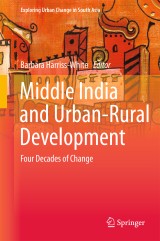Details

Middle India and Urban-Rural Development
Four Decades of ChangeExploring Urban Change in South Asia
|
96,29 € |
|
| Verlag: | Springer |
| Format: | |
| Veröffentl.: | 28.07.2015 |
| ISBN/EAN: | 9788132224310 |
| Sprache: | englisch |
Dieses eBook enthält ein Wasserzeichen.
Beschreibungen
<p><i>Middle India and Rural-Urban Development</i> explores the socio-economic conditions of an ‘India’ that falls between the cracks of macro-economic analysis, sectoral research and micro-level ethnography. Its focus, the ‘middle India’ of small towns, is relatively unknown in scholarly terms for good reason: it requires sustained and difficult field research. But it is where most Indians either live or constantly visit in order to buy and sell, arrange marriages and plot politics. Anyone who wants to understand India therefore needs to understand non-metropolitan, provincial, small-town India and its economic life. This book meets this need. From 1973 to the present, Barbara Harriss-White has watched India’s development through the lens of an ordinary town in northern Tamil Nadu, Arni. This book provides a pluralist, multi-disciplinary and inter-disciplinary perspective on Arni and its rural hinterland. It grounds general economic processes in the social specificities of a given place and region. In the process, continuity is juxtaposed with abrupt change. A strong feature of the book is its analysis of how government policies that fail to take into account the realities of small town life in India have unintended and often perverse consequences. </p><p>In this unique book, Harriss-White brings together ten essays written by herself and her research team on Arni and its surrounding rural areas. They track the changing nature of local business and the workforce; their urban-rural relations, their regulation through civil society organizations and social practices, their relations to the state and to India’s accelerating and dynamic growth. That most people live outside the metropolises holds for many other developing countries and makes this book, and the ideas and methods that frame it, highly relevant to a global development audience. </p>
<p><b>Chapter 1.</b> Introduction: The Economic Dynamism of Middle India.- <b>Chapter 2.</b> Local-Global Integration, Diversification and Informality: Long Term Change in Arni During the Late Twentieth Century.- <b>Chapter 3.</b> Arni’s Workforce: Segmentation Processes, Labour Market Mobility, Self-Employment and Caste.- <b>Chapter 4.</b> Local Capitalism and the Development of the Rice Economy: 1973-2010.- <b>Chapter 5.</b> A Future Not so Golden: Liberalisation, Mechanisation and Conflict in Arni’s Gold Ornaments Cluster.- <b>Chapter 6.</b> The Impact of Caste on Production Relations in Arni: A Gramscian Analysis.- <b>Chapter 7.</b> Technological Change and Innovation in Middle India: The Case of Arni’s Silk Cluster.- <b>Chapter 8.</b> The Making and Unmaking of Handloom Silk Weaving in the Arni Region.- <b>Chapter 9.</b> Institutional Change in Informal Credit: Through the Urban-Rural Lens.- <b>Chapter 10.</b> Feeling Rich on an Empty Stomach: Agrarian Crisis and Rural Consumption Choices.- <b>Chapter 11.</b> Epilogue– The future for Small Towns: The Case of Arni – or Ambur or Ranipet or Tiruppur or…?.- <b>Chapter 12.</b> The Arni Studies Bibliography, 1976-2014.</p>
<p>Barbara Harriss-White is Emeritus Fellow and Professor of Development Studies at Oxford University, Senior Research Fellow in Area Studies, Oxford University, coordinator of the South Asia Research Cluster at Wolfson College, Oxford and Fellow of the Academy of Social Sciences. Alone or with others she has written and edited 35 books and over 225 book chapters and journal papers, almost all on India. Her research interests span India’s small towns, agriculture and its energetics, the informal capitalist economy and its regulative politics and policy, and many aspects of deprivation.</p>
<p><i>Middle India and Rural-Urban Development</i> explores the socio-economic conditions of an ‘India’ that falls between the cracks of macro-economic analysis, sectoral research and micro-level ethnography. Its focus, the ‘middle India’ of small towns, is relatively unknown in scholarly terms for good reason: it requires sustained and difficult field research. But it is where most Indians either live or constantly visit in order to buy and sell, arrange marriages and plot politics. Anyone who wants to understand India therefore needs to understand non-metropolitan, provincial, small-town India and its economic life. This book meets this need. From 1973 to the present, Barbara Harriss-White has watched India’s development through the lens of an ordinary town in northern Tamil Nadu, Arni. This book provides a pluralist, multi-disciplinary and inter-disciplinary perspective on Arni and its rural hinterland. It grounds general economic processes in the social specificities of a given place and region. In the process, continuity is juxtaposed with abrupt change. A strong feature of the book is its analysis of how government policies that fail to take into account the realities of small town life in India have unintended and often perverse consequences. </p><p>In this unique book, Harriss-White brings together ten essays written by herself and her research team on Arni and its surrounding rural areas. They track the changing nature of local business and the workforce; their urban-rural relations, their regulation through civil society organizations and social practices, their relations to the state and to India’s accelerating and dynamic growth. That most people live outside the metropolises holds for many other developing countries and makes this book, and the ideas and methods that frame it, highly relevant to a global development audience. </p>
The only long-term urban study in India, and possibly worldwide Multi- and inter-disciplinary, emerging from the thematic discipline of development studies Uses a variety of theoretical approaches in a non-technical way, helping to transcend the gulf between economics and other social science disciplines like sociology and anthropology Includes supplementary material: sn.pub/extras
Diese Produkte könnten Sie auch interessieren:

Observing Systems for Atmospheric Composition

von: Guido Visconti, Pietro Di Carlo, W. Brune, M. Schoeberl, Andreas Wahner

149,79 €















